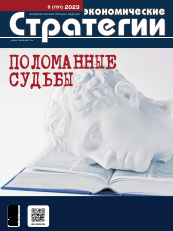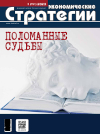Culture as an Instrument for Ensuring the National Interests of the Russian Federation in the Context of Global Transformations
DOI: 10.33917/es-5.191.2023.32-37
The article dwells on the role of Russian culture in the context of global transformations and emerging multipolarity. It is noted that the US line to neutralize cultural differences is utopian.
References:
1. Kartseva A.A. Dialog i vzaimodeistvie kul’tur kak uslovie sokhraneniya stabil’nosti sovremennogo sotsiuma [Dialogue and Interaction of Cultures as the Condition for Maintaining Stability of Modern Society]. Izvestiya Sankt-Peterburgskogo gosudarstvennogo agrarnogo universiteta, 2014, no 37, available at: https://cyberleninka.ru/article/v/vzaimodeystvie-i-dialog-cultur-kak-uslovie-sohraneniya-stabilnosti-sovremennogo-sotsiuma
2. Kontseptsiya gumanitarnoi politiki Rossiiskoi Federatsii za rubezhom [Concept of the Russian Federation’s Humanitarian Holicy Abroad], available at: static.kremlin.ru/media/events/files/ru/G3CkAuMhZXio8AzNaweT3wTGTaEA16OU.pdf
3. Vladimir Putin: Preslovutaya “kul’tura otmeny” prevratilas’ v “otmenu kul’tury” [Vladimir Putin: The Notorious “Cancellation Culture” has Turned into “Cancellation of Culture”] Rossiiskaya gazeta, 2022, Federal’nyi vypusk no 65(8713), available at: https://rg.ru/2022/03/28/vladimir-putin-preslovutaia-kulturaotmeny-prevratilas-v-otmenu-kultury.html
4. Prokof’ev V.I. “Bol’shoi balet vernulsya v Parizh” [“The Bolshoi Ballet has Returned to Paris”]. Rossiiskaya gazeta, 2023, 6 aprelya.
5. Mikhalkov N.S. “Kinoassorti dlya lyubitelei” [“Assorted Cinema for Lovers”]. Vechernyaya Moskva. Ezhednevnyi delovoi vypusk. Weekend, 2023, no 72(29406), 21 aprelya.
6. Vulf Virdzhiniya. Russkaya tochka zreniya [Woolf Virginia. The Russian Point of View], available at: http://www.apropospage.ru/herson/vulf/v7.html
7. Likhachev D.S. Russkaya kul’tura [Russian Culture]. Moscow, Iskusstvo, 2000, 428 p.










